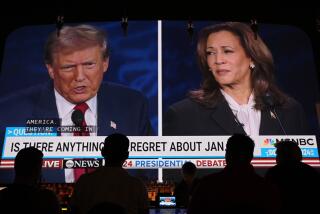Kerry Comes Under Attack During Debate
- Share via
GREENVILLE, S.C. — Howard Dean, reverting to the combative style he muted while campaigning in New Hampshire, challenged John F. Kerry’s convictions and effectiveness during a debate Thursday night among the Democratic presidential contenders.
Only Dean pressed a clear argument against Kerry, the senator from Massachusetts whose commanding victories in Iowa and New Hampshire have made him the race’s frontrunner.
Retired Gen. Wesley K. Clark, Sen. Joe Lieberman of Connecticut and Sen. John Edwards of North Carolina, in subdued performances, repeatedly passed on opportunities to draw contrasts with Kerry five days before seven states hold primaries and caucuses next Tuesday. South Carolina is one of the key contests, along with Missouri and Arizona.
Dean, who had been the favorite in early polls in Iowa and New Hampshire, sharpened the argument he hoped would reverse his slide in the race. The former Vermont governor insisted he had demonstrated more commitment to his principles than Kerry -- and more tenacity at driving them into law.
In the debate’s most pointed moment, Dean charged that Kerry had failed to produce results on healthcare during his long Senate career. And he contrasted this with initiatives he pressed in Vermont that expanded healthcare coverage for children and prescription drug benefits for seniors.
“Now, Sen. Kerry is the frontrunner, and I mean him no insult, but in 19 years in the Senate, Sen. Kerry sponsored nine, 11 bills that had anything to do with healthcare, and not one of them passed,” Dean said. “If you want a president who is going to get results, I suggest that you look at somebody who did get results in my state.”
Kerry defended his effectiveness and implied Dean did not understand how Washington works. Kerry said he had helped shaped legislation on health benefits for the mentally ill, expanding health insurance for children and improving care for low-income AIDS patients.
“One of the things that you need to know as a president is how things work in Congress if you want to get things done,” Kerry said. “And one of the things that happens in Congress is, you can in fact write a bill, but if you’re smart about it, you can get your bill passed on someone else’s bill and it doesn’t carry your name.”
But Dean refused to let the argument abate. Insisting that Kerry had given “what I consider to be a real Washington answer,” Dean belittled him for saying the laws he cited had improved healthcare for children or the mentally ill.
“I don’t think what Sen. Kerry was talking about has been very much help for the people of South Carolina or anyplace else,” Dean said.
The two sides continued their war of words after the debate. While Kerry’s camp issued a statement citing the senator’s work on an assortment of healthcare initiatives, Dean aides released a statement charging that none of the healthcare legislation Kerry had sponsored became law.
Dean’s attacks marked a new stage in the Democratic campaign. For months, while Dean led in the polls, Kerry and other Democrats had assailed his record and priorities.
But after Dean finished third in Iowa -- in part, the campaigns agreed, because of a backlash against a television ad he ran criticizing the other major Democratic contenders for their support of the Iraq war -- the candidates minimized criticism of one another.
Dean began to break that truce shortly before Tuesday’s New Hampshire vote, in which he finished second.
At Thursday’s debate, he showed clearly that he intends to portray himself as an outsider with a record of accomplishment and Kerry as an ineffective Washington insider.
Kerry was confident and calm, maintaining a temperate tone even in his exchanges with Dean.
Dean and the other Democrats passed on an opportunity to criticize Kerry when NBC news anchor Tom Brokaw, the debate moderator, asked the candidates about the North American Free Trade Agreement. Many in South Carolina have blamed the trade pact for the loss of manufacturing jobs, especially in the textile industry.
Rather than questioning Kerry on his support for the treaty in 1993, Edwards tried to underscore his personal identification with mill workers facing eroding opportunities.
“I think the truth of the matter is, we need to start by recognizing the pain” experienced by those who have lost jobs, he said.
Lieberman, while defending NAFTA, chose not to criticize Kerry over his recent statements qualifying his support for free trade he has demonstrated through most of his Senate career.
Lieberman, though, clearly separated himself from the tough-on-free-trade language adopted by his rivals. “You can’t create jobs by building a wall around America,” he said.
Rep. Dennis J. Kucinich of Ohio reiterated that his first act as president would be to cancel NAFTA.
Clark and Edwards focused more on their backgrounds, emphasizing their Southern roots. They also portrayed themselves as political outsiders.
“I want to make very clear that I’m not a career politician, I’m not a Washington insider,” Clark said. “I am an outsider.... If the American people like what is going on in Washington, then they should vote for people who’ve been there and been part of the Washington scene.”
Edwards, born in South Carolina and reared in North Carolina, obliquely criticized Kerry over comments he recently made implying that Democrats could recapture the White House without the South.
“It’s enormously important for us to ... have a president that people in the South and all across the country believe represents them,” he said.
The Rev. Al Sharpton, who has campaigned extensively in South Carolina and established a base of support among its African Americans, made a pointed reference to the South’s history of segregation.
“I’ve been inspired in this campaign hearing John Edwards talk about he’s a son of a mill worker,” Sharpton said. “Well, I’m the son of a man who couldn’t be a mill worker because of the color of his skin.”
*
Times staff writer Scott Martelle contributed to this report.
More to Read
Get the L.A. Times Politics newsletter
Deeply reported insights into legislation, politics and policy from Sacramento, Washington and beyond. In your inbox twice per week.
You may occasionally receive promotional content from the Los Angeles Times.










